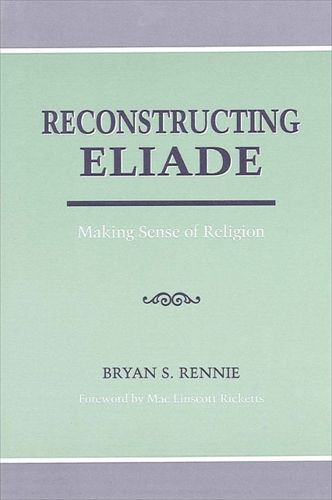Readings Newsletter
Become a Readings Member to make your shopping experience even easier.
Sign in or sign up for free!
You’re not far away from qualifying for FREE standard shipping within Australia
You’ve qualified for FREE standard shipping within Australia
The cart is loading…






Reconstructing Eliade is a concept-by-concept analysis of the thought of Mircea Eliade and a re-evaluation of his analysis of religion. It illustrates how a thorough familiarity with Eliade’s work can produce an interpretation of his thought as systematic, coherent, and fully rational. Part One provides an analysis of the terms of Eliade’s understanding of religion–hierophany, the sacred and the dialectic of the sacred and profane, homo religiosus, myths and symbols–and thus of the meaning of religion implied throughout his work. Part Two inspects various problems which arise in light of this analysis, particularly relativism and the role of commitment. Part Three applies this analysis to certain problems–religion in the modern world and Eliade’s unfinished analysis of the modern, the postmodern phenomenon, implicit religion, and various related problems in the study of religion. Far from being outmoded and inadequate, Eliade’s thought is suggested to be fertile ground for the reconception of religious realities in the contemporary world.
$9.00 standard shipping within Australia
FREE standard shipping within Australia for orders over $100.00
Express & International shipping calculated at checkout
Reconstructing Eliade is a concept-by-concept analysis of the thought of Mircea Eliade and a re-evaluation of his analysis of religion. It illustrates how a thorough familiarity with Eliade’s work can produce an interpretation of his thought as systematic, coherent, and fully rational. Part One provides an analysis of the terms of Eliade’s understanding of religion–hierophany, the sacred and the dialectic of the sacred and profane, homo religiosus, myths and symbols–and thus of the meaning of religion implied throughout his work. Part Two inspects various problems which arise in light of this analysis, particularly relativism and the role of commitment. Part Three applies this analysis to certain problems–religion in the modern world and Eliade’s unfinished analysis of the modern, the postmodern phenomenon, implicit religion, and various related problems in the study of religion. Far from being outmoded and inadequate, Eliade’s thought is suggested to be fertile ground for the reconception of religious realities in the contemporary world.